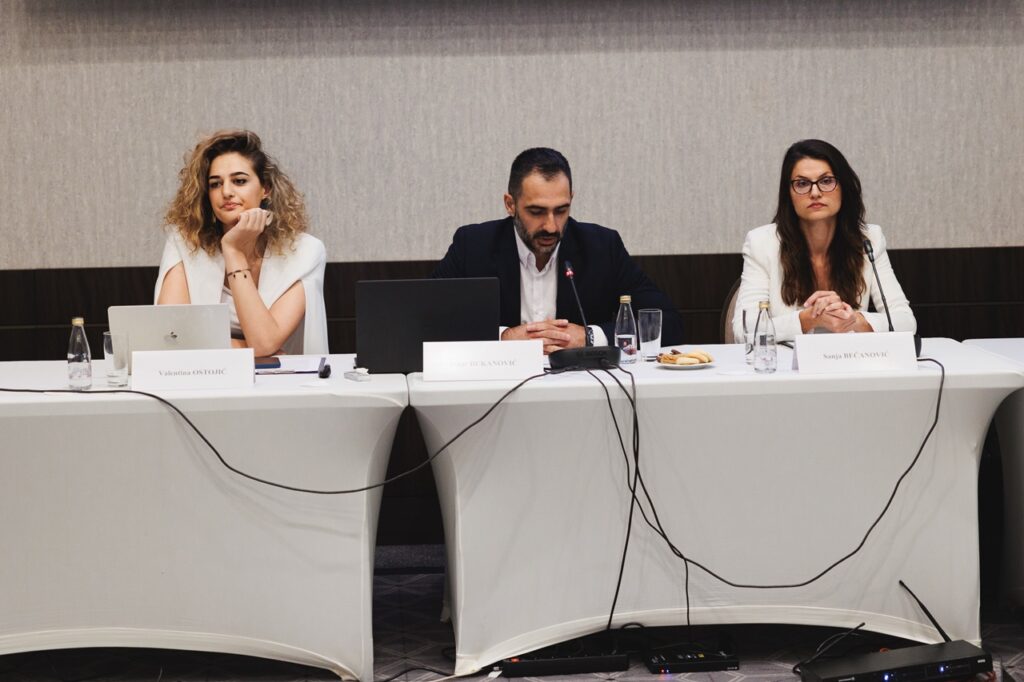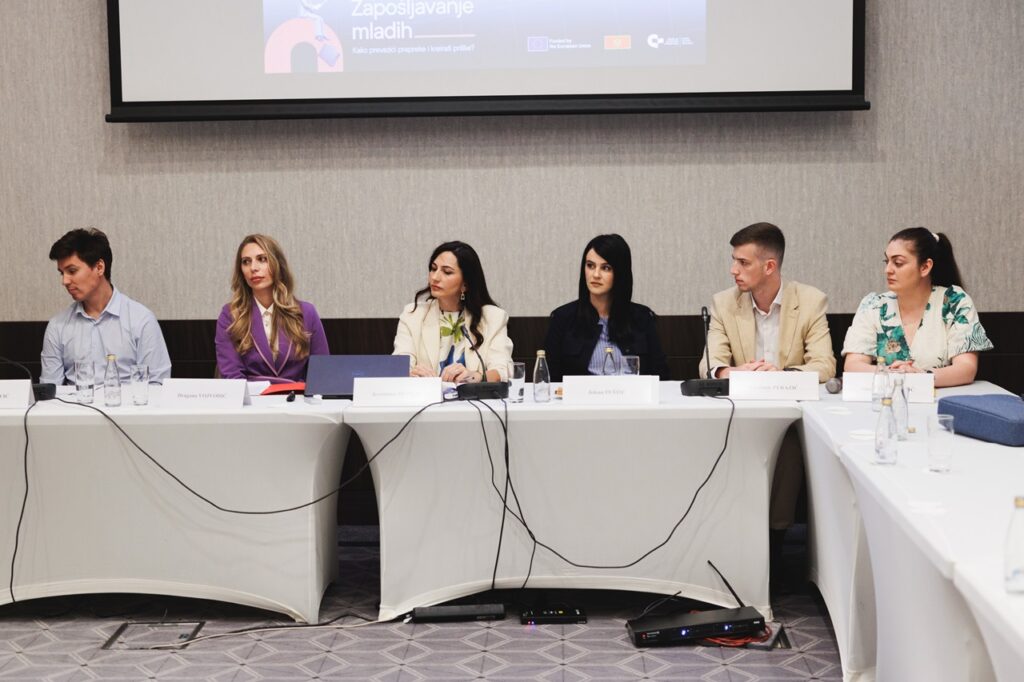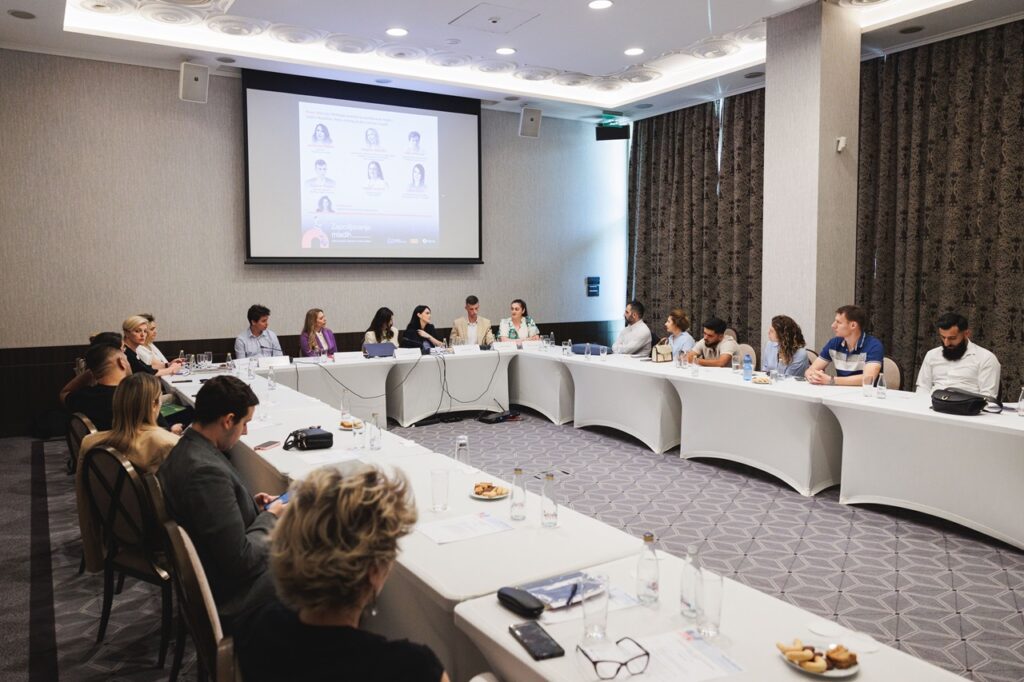“Young people have become a less employable group in our society, and the education system often does not keep up with market needs. While there are perspectives for overcoming this problem, they require coordinated and strategic efforts, and some programmes, such as the Youth Guarantee, are expected to be implemented quickly,” was emphasized at the round table “Youth employment – how to overcome obstacles and create opportunities?”, organized by the Centre for Civic Education (CCE) within the YouthJobLink – linking youth and social enterprises, supported by the EU through the Directorate for Financing and Contracting of EU Aid Funds (CFCU) of the Ministry of Finance.
Sanja Bečanović, acting Director General of the Directorate for Financing, Contracting and Implementation of EU Support Funds of the Ministry of Finance, stated that the Grant Scheme Support for Employment, Social Inclusion and Social Entrepreneurship, as part of the 2020 allocation action programne, includes 24 projects with a total value of around 2.5 million euros. “This grant scheme aims to promote employment, especially for ‘hard to employ’ categories in society, such as social welfare recipients, women, low-skilled unemployed, people with disabilities and young people. Also, the goal is to raise awareness of social entrepreneurship in Montenegro,” explained Bečanović. She mentioned that through the work of the Sector Operational Programmme for Montenegro in the field of employment, education and social policies, 24 grant agreements were signed through three grant schemes worth around 4.3 million euros, of which 85% are EU funds and 15% are national contributions, while through the Self-Employment Support Programme, a direct grant was concluded with the Employment Agency of Montenegro in the amount of 3.5 million euros.
“According to CCE data, between 50 and 60% of young people in Montenegro are unemployed, 40% of young people want to leave the country, while 62% still live with their parents, and about 55% believe that personal acquaintances and relationships or party membership crucial for finding a job“, stated Petar Đukanović, CCE programme director, adding that young people leave school and college without practical skills for the modern labour market, and that 70% are looking for a job for more than two years after finishing school. “Key measures to overcome this problem include reforming the education system, adapting education to the needs of the labor market, introducing practical training and developing programs for new technologies and industries,” he said. He also emphasized the importance of establishing an effective Government Youth Guarantee programme in Montenegro, which would contribute to reducing youth unemployment, increasing workforce competitiveness and preventing social exclusion. “Also, transparency in employment and stricter penalties for corruption are key to ensuring that the best candidates get a job based on merit,” Đukanović concluded.
Valentina Ostojić, programme associate at CCE, presented the content of the YouthJobLink project – linking youth and social enterprises. “This project was created as a response to major problems with unemployment and growing socio-economic challenges in the country, especially those affecting young people. Several studies have indicated the concerning situation,” she said, elaborating on data from the CCE, EAM (Employment Agency of Montenegro), as well as official data from Monstat. “Through this project, we included 40 unemployed youth who underwent a three-month intensive capacity building training. Then 10 of them were employed in 10 different social enterprises and NGOs for a period of six months. Also, 20 enterprises underwent training in the field of youth employment and of social entrepreneurship,” explained Ostojić, indicating that the project does not stop at these achievements. “There will be a campaign that will contribute to the importance of raising public awareness of social entrepreneurship, a study on good practices and a final conference,” added Ostojić.
During the panel “Strategies of cooperation for youth employment – insights from the Assembly, the Government, civil society, business and youth”, member of the Parliament of Montenegro, Jevrosima Pejović, shared her observations and experiences in this field. “My previous work was focused on policies related to youth and other vulnerable categories. It saddens me when I see similar numbers and hear the same challenges from research. This tells us that the process of change is not easy and that it is challenging if we do not set clear goals – improving the economic position of citizens on which we should all work. This is not only the task of the Government, but also of the Parliament, of the economy, all of us,” said Pejović. Speaking about the necessary changes in education, Pejović warned of the danger of identity issues that can easily undermine efforts in education reform, and pointed to the problem of disrespecting previous efforts and strategies. “It is very important to see which parts of the system are not working and to diagnose deficiencies to implement meaningful reforms. I do not remember that there was a Government that had a long-term strategy through the exposition. Developed countries have strategies for 15 years that are binding for every subsequent government. This is the direction of society’s movement, the set goals that every subsequent government should work on,” Pejović pointed out.
Dragana Vojvodić, acting Director General of the Directorate for Social Dialogue and Collective Bargaining of the Ministry of Labor and Social Welfare, who is the co-ordinator of the Youth Guarantee programme, emphasized that Montenegro recognized the interest in providing young people with increased support to integrate more efficiently into the labour market. “The Youth Guarantee programme, which has been implemented in EU member states since 2013, ensures that young people aged 15-29 receive a quality offer for a job, internship or training within four months of ending employment or completing formal education. The goal of this programme is to reduce unemployment among young people, facilitate the transition from the educational system to the working environment, and promote cooperation between educational institutions and the economic sector through dual education programmes,” she explained. She also emphasized the importance of inclusive employment, especially for young people from rural areas, through targeted support programmes. “Representatives of institutions, social partners and NGOs participated in the meetings of the working groups for the implementation of the programme, contributing to the implementation plan of the Youth Guarantee programme with EU directives,” said Vojvodic. She announced that the programme has been approved by all institutions and is expected to be adopted by the Government today. The programme will be implemented during 2025/26 in three pilot municipalities – Bijelo Polje, Nikšić and Ulcinj, before being rolled at the national level. “Piloting will take place in parallel with vocational education reforms, providing equal opportunities and reducing unemployment for young people, especially NEET young people,” she stated.
Vuko Jovanović, adviser in the Education and Quality Sector of the Chamber of Commerce, assesses that the speed of economic development is faster than that of institutions. “In recent years, especially after the pandemic, there have been changes in trends in education and employment. In the Chamber of Commerce, we are actively working to provide opportunities for young people, including the possibility of retraining for deficit occupations, such as the service sector in our tourist-oriented country. However, the interest is insufficient, and data from the field indicate that we have a problem of a lack of workers,” said Jovanović, recognizing the problem of higher education graduates who are waiting for employment. “We are trying to direct young people towards areas where there is room for them. Institutions are positioning themselves as the largest employer, which may result from social or educational factors, and the market should be open, and the burden of employment should not be solely on the state,” Jovanović assessed. He emphasized the importance of stimulating young people to start their own businesses and work in the private sector. “Internationalization can be a double-edged sword. Young people who leave often return and start their own companies. We have something to offer young people, but we must straighten the crooked paths and show more courage and tact for the future,” Jovanović concluded.
“I am happy about the fact that the Government will adopt the Youth Guarantee programme. It seems that the situation is changing, but we can and must do better to ensure that the voice of youth is heard,” said Vladimir Perazić, Secretary General of the Youth Network of Montenegro. He reflected to the Youth Network project. “Through the M’BASE programme implemented by CCE, our idea was supported, within which the key activity was the Youth Parliament, which gave us the opportunity to talk with decision-makers. Entrepreneurship and employment are the topics that young people highlighted as the most important issues,” he explained, indicating to the need for greater involvement of young MPs in addressing youth problems. “The re-establishment of youth wings of political parties and greater involvement of young MPs in youth issues are necessary. Young people in the Parliament must deal more with young people and the problems they face,” said Perazić. He highlighted out the need for reform of formal education and support for informal education. “Young people continue to choose popular professions such as lawyers and economists, while trades are neglected. Career counseling is still limited to advice from parents. What young people lack in formal education, they seek in informal education, which provides great support and helps them be qualified and prepared for the labour market,” concluded Perazić.
Marija Lazarević, participant of the YouthJobLink programme, praised the organization of projects, workshops and addressing topics such as social entrepreneurship and project writing. “So far, I was more focused on the subjects I am studying, but it is different when you have someone in front of you who clearly presents the expectations of employees. That is why the CCE programme was a great opportunity for better preparation and later application of knowledge in employment.” said Lazarevic. Lazarević started her work at the elementary school in Pljevlja, where she had no opportunity for practical teaching. “I had previously volunteered there to apply what I had learned theoretically. Through the job I got through this project, I went through four offices, worked as an assistant, attended trials, and was available to everyone. This enriched my knowledge as a future lawyer and I am very satisfied because I made contacts that will be important to me in the future,” emphasized Lazarević. She pointed out that there are no opportunities to apply theory in practice at the faculty. “I believe that practice should be based on a certain period introduced. We are not prepared for work and what awaits us on the labor market. On the other hand, the knowledge I gained during the trainings, as well as the part-time jobs I had, were very useful,” Lazarevic pointed out.
Jelena Fuštić, Executive director of the Youth and Non-formal Education Forum – MNE Forum, considers that NEET youth (not in employment, education or training) do not receive adequate support. “Through work in working groups and organizations, we only recently started talking about young people who are not in the system, and the situational analysis and a series of research showed that the solution is not simple because this category is heterogeneous, with several subgroups,” Fuštić pointed out. She explained that there are inactive young people who are not able to work for various reasons – PWDs, due to family obligations, personal reasons or are discouraged, but also for unspecified reasons. “It is interesting that there are more men in the NEET category, while there are more women among inactive young people mostly due to family obligations. It is particularly worrying that there are many university students among them, which indicates that the education reform has not produced the desired results. It is even more worrying that these young people have a higher probability of becoming long-term unemployed,” said Fuštić. However, she emphasizes that these data can be interpreted in different ways – that young people do not accept any employment or that the Montenegrin economy cannot absorb such a large number of university graduates. “That’s why the reform of the Employment Service is necessary in order to better promote deficit occupations, and to give young people concrete information about the labor market.” “Reforms of institutions, especially Employment Agency of Montenegro, and an increase in the number of staff working with young people are needed, to the detriment of management and administrative staff,” stressed Fuštić.
The round table gathered 30 representatives of institutions, youth organizations, educational institutions, private companies and civil society organizations that deal with youth employment and career development to discuss the position of young people and employment measures for young people, the obstacles that young people face in the labor market, but also gave recommendations that can help improve their chances for employment.
Maja Marinović, programme associate



